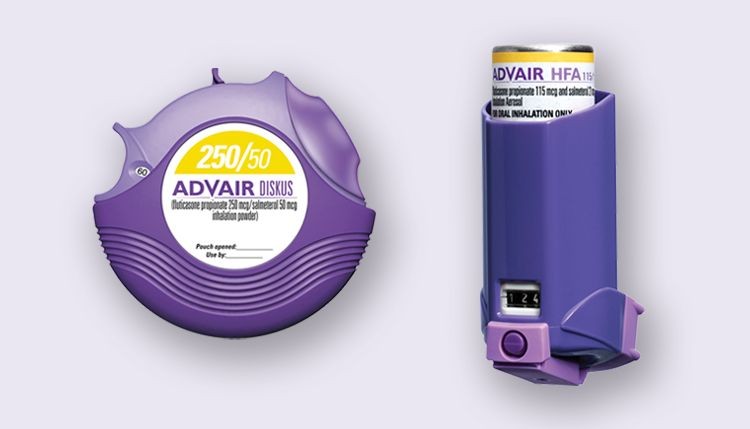
Contents
- 1 Fluticasone Propionate and Salmeterol Oral Inhaler
- 1.0.1 Uses for Advair Diskus, Advair HFA
- 1.0.2 Side effects of Advair Diskus, Advair HFA
- 1.0.3 Dosage for Advair Diskus, Advair HFA
- 1.0.4 Drugs or supplements that interact with Advair Diskus, Advair HFA
- 1.0.5 Safety during pregnancy or while breastfeeding
- 1.0.6 Other important information about Advair Diskus, Advair HFA
- 1.0.7 Summary
Fluticasone Propionate and Salmeterol Oral Inhaler
Advair is a combination of inhaled drugs used to treat asthma and chronic bronchitis.
Brand names available for Fluticasone Propionate and Salmeterol Oral Inhaler
Advair Diskus and Advair HFA are the brand names available for Fluticasone Propionate and Salmeterol Oral Inhaler in the US.
Is Advair Diskus, Advair HFA available as a generic drug?
Do I need a prescription for Advair Diskus, Advair HFA?
Uses for Advair Diskus, Advair HFA
- Advair Diskus treats asthma or chronic obstructive pulmonary disease (COPD) associated with chronic bronchitis. Its action starts within 30 to 60 minutes and can last more than 12 hours.
- Advair Diskus is generally not needed in patients with easily controlled asthma.
- Advair HFA treats asthma in individuals 12 years old or older.
- Advair Diskus or HFA should not be used to treat acute episodes of asthma or COPD.
Side effects of Advair Diskus, Advair HFA
- Use of long-acting agents like salmeterol, found in Advair, may increase the risk of asthma-related death. Therefore, Advair should only be used in patients whose asthma is uncontrolled by other agents, and who are using long-term asthma-controlling medications such as an inhaled corticosteroid.
SIDE EFFECTS:
- Upper respiratory tract infections occur in 20% to 25% of patients using Advair.
- Headaches occur in about 1 in 8 patients.
- Other common adverse events include:
- Nausea,
- Vomiting,
- Diarrhea,
- Mouth or throat candidiasis,
- Musculoskeletal pain,
- Throat irritation,
- Difficulty speaking (dysphonia),
- Hoarseness,
- Upper respiratory tract inflammation,
- Palpitations,
- Tremor,
- Cough,
- Sinus infection,
- Pneumonia,
- Dizziness,
- Skin reactions,
- Taste changes,
- Musculoskeletal pain.
Use of long-acting agents like salmeterol, an active ingredient in Advair, may increase the risk of asthma-related death. Therefore, Advair should only be used in patients whose asthma is uncontrolled by other agents, and who are using long-term asthma-controlling medications such as an inhaled corticosteroid.
Serious adverse events of Advair include:
Serious allergic reactions include:
- Adrenal suppression,
- Growth suppression,
- High blood pressure,
- Low blood pressure,
- Worsening of asthma,
- Osteoporosis,
- Glaucoma,
- High blood glucose,
- Low potassium,
- Cardiac arrest,
- Cataracts.
QUESTION
Dosage for Advair Diskus, Advair HFA
- The recommended Advair Diskus regimen for asthma in individuals 12 years and older is one inhalation twice daily (morning and evening) approximately 12 hours apart.
- The lowest effective strength should be used and the maximum dose is 500/50 mcg twice daily.
- For children 4 to 11 years old the recommended treatment is one inhalation of 100/50 mcg twice daily.
- The recommended regimen of Advair Diskus for COPD is one inhalation of 250/50 mcg twice daily. Higher doses are not more effective.
- The recommended dose for Advair HFA is 2 inhalations twice daily. The lowest effective dose should be used.
The Diskus device is held in one hand with the thumb of the other hand placed on the thumb-grip. The thumb is then pulled away as far as the device allows until the mouthpiece seems to click into position. With the Diskus then held horizontally and with the mouthpiece towards the patient, the lever is then slid away as far as it can go until it clicks. The patient breathes out as far as comfortable, then placing his mouth to the mouthpiece, breathes in quickly and deeply and holds his breath for about ten seconds. The patient then washes his or her mouth without swallowing after inhalation.
Drugs or supplements that interact with Advair Diskus, Advair HFA
- Monoamine oxidase inhibitors or MOAIs (for example, tranylcypromine) and tricyclic antidepressants (for example, amitriptyline [Endep, Elavil]) may increase the effect of salmeterol on the heart and blood pressure. Since Advair contains salmeterol, it should not be used with or within two weeks of discontinuing MOAIs or tricyclic antidepressants.
- Ritonavir (Norvir), atazanavir (Reyataz), clarithromycin (Biaxin), indinavir (Crixivan), itraconazole (Sporanox), ketoconazole, nelfinavir (Viracept), and telithromycin (Ketek) may increase levels of fluticasone in the body by reducing its breakdown. This may increase side effects of Advair.
- Beta blockers (for example, propranolol) block the effect of salmeterol and may also produce severe bronchospasm in patients with asthma. Therefore, patients with asthma should not be treated with beta-blockers unless necessary. Beta-blockers that have less effect on the heart should be used if combined with salmeterol.
Safety during pregnancy or while breastfeeding
- Adequate studies of fluticasone or inhaled salmeterol during pregnancy have not been done. Fluticasone use during pregnancy should be avoided unless the potential benefit justifies the potential risk to the fetus. In some pregnant animals exposed to very high doses of oral salmeterol, offspring with birth defects have been observed. The concentrations of salmeterol in the blood after these doses were much higher than those from inhalation by patients. Salmeterol inhalation should be used during pregnancy only if the potential benefit justifies the potential risk to the fetus.
- It is not known if fluticasone propionate is excreted in breast milk. Other medications in the same class as fluticasone propionate are secreted into breast milk, but it is not known whether the small amounts that may appear in the milk have effects on nursing infants. In rats, salmeterol is excreted in milk. Therefore, caution should be exercised when salmeterol is administered to nursing women.
Other important information about Advair Diskus, Advair HFA
Preparations of Advair Diskus, Advair HFA
- Advair Diskus is an oral inhalation powder available in three different forms containing the same amount of salmeterol, 50 mcg, but differing in the amount of fluticasone propionate.
- 100/50 provides 100 mcg of fluticasone propionate, 250/50 provides 250 mcg of fluticasone propionate, and 500/50 contains 500 mcg of fluticasone propionate per inspiration.
- Advair HFA is an oral aerosol containing 21 mcg of salmeterol combined with 45, 115, or 230 mcg fluticasone.
Storage of Advair Diskus, Advair HFA
- Advair should be stored at room temperature, 68 F to 77 F (20 C to 25 C).
- Keep it away from heat or flames and do not puncture it.
- Do not freeze it or place it in direct sunlight.
How does Advair Diskus, Advair HFA work?
- In patients with asthma, the smaller airways (bronchioles) through which air moves in and out of the lungs can be narrowed by accumulation of mucus, spasm of the muscles that surround these airways, or swelling of the lining of the airways due to inflammation. Airway narrowing leads to symptoms of shortness of breath, wheezing, cough, and congestion. Medications used in treating asthma include bronchodilators to open airways and reduce inflammation.
- Advair contains salmeterol, a long-acting bronchodilator, and fluticasone propionate, an anti-inflammatory corticosteroid. Salmeterol attaches to beta-2 receptors on the smooth muscle cells surrounding the airways, causing the muscle cells to relax and open the airways. Fluticasone propionate is a synthetic corticosteroid that reduces inflammation within the airways, reducing swelling and mucus production. In lower doses, little fluticasone propionate is absorbed, resulting in infrequent side effects. Higher doses may cause side effects throughout the body.
FDA approval of Advair Diskus, Advair HFA
- Advair Diskus was approved by the FDA in August 2000 and Advair HFA in June 2006.
Summary
Advair Diskus, Advair HFA is an inhalant drug used to treat asthma, chronic bronchitis, and chronic obstructive pulmonary disease (COPD). Review side effects, drug interactions, warnings, precautions, and pregnancy and breastfeeding safety information prior to taking any medication.


